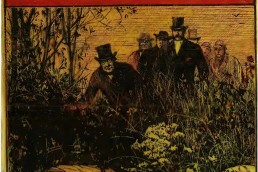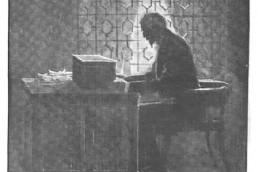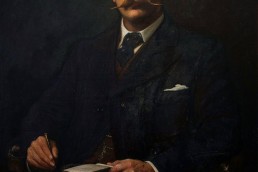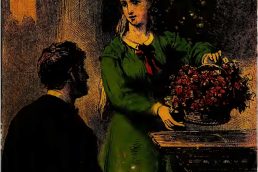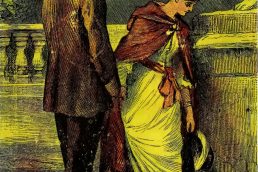Serialised fiction in the Bolton Weekly Journal – Taken at the Flood (1873-74) by Mary Elizabeth Braddon
Mary Elizabeth Braddon – best known for one of, if not the, most famous sensation fiction novel Lady Audley’s Secret – has links to Bolton through the serialisation of another of her stories. Taken at the Flood was published from August 1873 to April 1874 in thirty-four weekly instalments in the Bolton Weekly Journal, and received distinctly varied reviews from critics at the time. Contemporarily, the book is regarded to amalgamate numerous, typically Victorian, themes – bigamy, murder, and crossed identity.
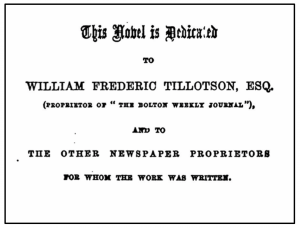

Indeed, it is evident from reading that Taken at the Flood is not too dissimilar at all from Braddon’s renowned sensation novel. Upon its conclusion in 1874, the Saturday Review of Politics, Literature, Science and Art regarded the work to be Braddon’s reversion to “her old hunting grounds” (Saturday Review, 1874, p.665) in that the story provides “a series of crimes and psychological monstrosities sufficient to stock a small circulating library” (p.665).
While in the same review Braddon is commended for her choice of heroine – a woman whom the critic likens to the conquering yet often vulnerable and sometimes unpleasant women of mythical, traditional and biblical stories – she is also denigrated for her return to the sensationalised crime story. They perceive that “small danger lies in the description of violent sensational crimes” (p.666) which undoubtedly, they believe, leads to “harm of the worst kind” (p.666) when sinful behaviour is depicted as distinctly commonplace to the corruptible and susceptible audience. This reviewer markedly announces that Taken at the Flood lacks faith in humanity – all the characters are bad or weak in some way, and those who aren’t obviously flawed are lacklustre and unlovable. It seems this reviewer may well have slotted nicely into the story they have such low estimations of, while seemingly overlooking the happily ordinary quality, truly reflective of society. Believing that the sensation fiction the public so obviously adored and yearned for would inadvertently put the public at great peril perhaps depicts the critics own distinct lack of faith in humanity. Nevertheless, their detailed review corroborates the themes we know today to be typical of Victorian literature – “crime, crooked morality, and forced similes” (p.666).
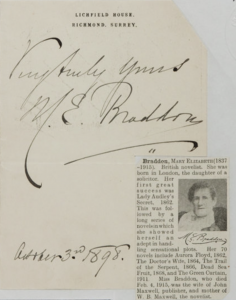

Conversely, The Athenaeum’s regard of the crime novel is distinctly different. While the section dedicated to the serialised novel is markedly shorter, the tone is much more on the side of veneration as Taken at the Flood is highlighted as one of their ‘Novels of the Week’. Instead of simply returning to her “old hunting grounds” (Saturday Review, 1874, p.665) as aforesaid by the Saturday Review, The Athenaeum praises that she has finally reverted to her infamous “best style” (The Athenaeum, 1874, p.592). They further declare that the book is in fact far better than the works she had penned in the two years previous, “a tale really worthy of her talent” (p.592). It seems a return to serialised sensation fiction worked in Braddon’s favour, working to underscore where her aptitude lay. This critic is much more appreciative of Braddon’s talent, and not so focused on the supposed way romanticising crime and detailing poor morality will detrimentally affect society, while simultaneously recognising that this novel is not actually “a great novel, but… a thoroughly good one” (p.592).
Read an interesting overview of Braddon’s life here.
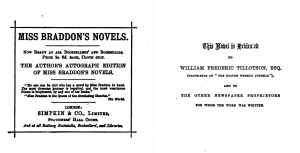

“No one can be dull who has a novel by Miss Braddon in hand. The most tiresome journey is beguiled, and the most wearisome illness is brightened, by any one of her books.” The World. Promotional note in the opening pages of Taken at the Flood.
Bibliography
Anon. (n.d.) Mary Elizabeth Braddon. Mary Elizabeth Braddon. [Online] Available at: <https://maryelizabethbraddon.com/> [Accessed 9 March 2021].
Anon. (1874) Taken at the Flood. Saturday review of politics, literature, science and art, 37(969), pp. 665-666.
Anon. (1874) Novels of the Week. The Athenaeum, (2427), pp. 592-593.
Braddon, M. E. (1874) Taken at the Flood: A Novel. [Online] London: Maxwell. Available from <https://archive.org/details/takenatfloodano00bradgoog/mode/2up> [Accessed 9 March 2021].
Heritage Auctions, (n.d.) Mary Elizabeth Braddon (1837-1915, British Writer). Clipped Signature and Obituary. [Online image] Available at: <https://historical.ha.com/itm/autographs/authors/mary-elizabeth-braddon-1837-1915-british-writer-clipped-signature-mounted-to-paper-very-good/a/201235-92008.s?ic16=ViewItem-BrowseTabs-Auction-Archive-ThisAuction-120115> [Accessed 12 March 2021].
Photo of Braddon’s autograph. n.d. [Online image] Available at: <https://www.collectors.com/autograph/maxwell-mary-elizabeth-braddon/8832428598788624607> [Accessed 10 March 2021].


